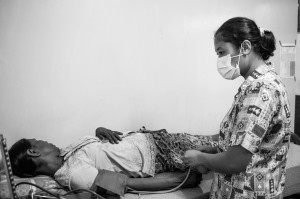As monsoon rains sweep across Burma from India, villagers in Karen State and along the Thai Burma border are prey to malaria.
 In the last 10 years, the fight against the malaria parasite has seen dramatic decreases in deaths. The World Health Organisation estimates that there has been a 42% reduction in mortality rates from the parasite in the last 15 years.
In the last 10 years, the fight against the malaria parasite has seen dramatic decreases in deaths. The World Health Organisation estimates that there has been a 42% reduction in mortality rates from the parasite in the last 15 years.
Nevertheless, the toll is still high, with WHO statistics estimating that of the 207 millions cases of malaria in 2012, 600 000 people from 97 countries died.
WHO estimates that 37% of the Burma’s population – 19.5 million people – lives in areas of high malaria transmission.
Daw Ngae, 50, a sweets seller from Myawaddy, explained her symptoms when she first fell ill with malaria.
“I was feeling weak, I had terrible headaches and a fever, the worst part was I couldn’t get painkillers in Myawaddy because the shops were closed in the evening when I came back from Mawlamyine,” she said to Karen News.
Malaria is a huge health concern for people in Burma, Daw Ngae said. “Many people I know get sick with malaria in Myawaddy. Every wet season we are all nervous about getting sick. We have mosquito repellent and nets but we have to work outside the whole day during wet season to make a living to survive – this is when we get sick.”
Daw Ngae claimed that the malaria drugs she took in Burma did not work so she crossed the Thai Burma border to seek treatment in Mae Tao Clinic.
“This is the second time I have had to have treatment. I took medicine at Mawlamyine hospital [in Burma], but it didn’t make me better so I came to Mae Tao Clinic four days ago. Healthcare is very bad there.”
“One of the worst things was that the healthcare in Burma is so expensive. When I got sick with Malaria I had to pay 8,000 Kyat for the drugs. That is two day’s wages for me. So I came [to MTC] even though it is very difficult and expensive to cross the border right now. Now I have no money to get back and I don’t know what I will do.”
Naw Mu Mu, the nurse treating Daw Ngae at MTC confirmed to Karen News that many patients came to the Clinic from Burma because the healthcare system there was expensive and the treatment poor.
“Malaria is a big problem for us at MTC this time of year. It is like this every year and doesn’t seem to get much better even though Burma has started to change. People come here because healthcare inside Burma is very expensive for them, or because it doesn’t help them when it should. The situation is very difficult.”
Louise, the head nurse at adult In Patient Department at MTC explained why she saw malaria patients every day.
“Malaria we see everyday – often because migrant workers or people from Burma have to work as farmers then they get infected easily in this sort of work. The start of June we started seeing people with malaria coming in every day. It is a serious health issue.”
As noted on the WHO website, Malaria is caused by a parasite called Plasmodium, which is transmitted from the bites of infected mosquitoes.
The parasites infect red blood cells, multiplying in the liver.
The Symptoms of malaria include high fever, headaches, and vomiting, and usually appear between 10 and 15 days after the mosquito bite. WHO warned that, if not treated, malaria could quickly become life threatening by disrupting the blood supply to vital organs.
There are several ways in which to control malaria, including: treatment with anti-malaria drugs; use of nets coated in insecticidal; indoor spraying with insecticide; mats and nets for those living in bamboo huts or where floors have holes and gaps in them for mosquito’s to fly through; and mosquito repellant.


